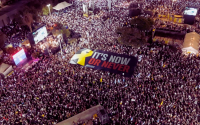Common Dreams / Published on Monday, June 19, 2006 by the Toronto Star / Canada
The fierce cultural aversion to the long reach of government is emblazoned on every licence plate here, an omnipresent statement that should make Rich Tomasso's job easier.
But even a man who makes it his business to protect individual liberties in a state where no government would dare collect a sales tax or personal income tax — or force a seatbelt around a driver or a helmet on a motorcyclist — has to face some harsh realities in George W. Bush's America. "People are more afraid of terror than having their privacy violated," says Tomasso, chair of the New Hampshire Liberty Alliance. "For so long the rhetoric has been about fear, not hope and more traditional American values." "Live Free or Die" is not just a cheesy licence plate slogan in this tiny New England state. But even New Hampshire is not immune to the national erosion of civil liberties that has permeated every part of the United States since terrorists forced their way into airline cockpits almost five years ago, taking away a nation's bravado and replacing it with fear. The exploitation of that fear by an administration intent on inflating the powers of the presidency, at the expense of a cowed Congress and with the tacit approval of an anxious nation, may be a cautionary tale for Canadians should some of that U.S.-style fear find its way north of the border in the wake of Toronto's recent terrorism arrests. In recent years, it has become a truism that Americans will trade away some liberties because they have been attacked. Canadians have not. But where is that rugged U.S. individuality that had helped define this nation? "Canadians, over the past couple of decades, appear to be much more aware of civil liberties. They have the balance just about right between the sense of community and individualism," says Phillip Cooper, an expert on separation of powers at Portland State University in Oregon. "I hope this politics of fear doesn't gravitate across the border. One hopes that your country won't see the polarization we have here. Canadians look down here and see this U.S. individuality, but it has become a fearful, combative individuality." Since Bush declared his global war on terror, "it has become a war on American citizens," says Dan Belforti, who is running for the U.S. Congress as a Libertarian candidate in New Hampshire. It started with the country — those of all political stripes — rallying around a leader who cast the U.S. as victim, declaring the rest of the world was either with him or against him. Bush and his inner circle allowed to stand the perception that the Iraq war was linked to Sept. 11, 2001 — a belief still held today by a substantial number of Americans. With the threat of another attack foremost in their minds, Americans looked the other way as "enemy combatants" were held without due process at Guantanamo Bay, shrugged amid revelations their government was secretly picking up terrorist suspects and flying them to countries with ugly human rights records, yawned when they were told the CIA might be holding prisoners in secret sites in Eastern Europe. But more surprising has been the lack of pushback when they were told the Bush administration had ignored a law requiring court approval and had begun wiretapping international calls of Americans and assembling a massive databank of phone records of Americans. In Canada, the Canadian Security Intelligence Service must get court approval before conducting any electronic surveillance, and the Communications Security Establishment needs written authorization from the minister of defence. Here, Bush argued his constitutional power overrode the need to go to a court that took too long to give approval anyway. More quietly, Bush has claimed, some 750 times, the authority to disobey laws he has signed — including a much-publicized ban on torture — if they conflict with his interpretation of the U.S. Constitution. No U.S. president has ever invoked that right so many times. The U.S. Congress has passed legislation that essentially establishes a national ID card, and there are calls for a national DNA registry of Americans. The Bush administration believes it is on the winning side when it comes to the tug between security and liberty. "When you push even the harshest critic, even they say, `Yeah, we should be listening to Al Qaeda,'" a senior administration official told The Washington Post, making a reference to the wiretapping program. "So from that perspective, that's a winning (issue) and we're on the side of the public." But there have been recent signs that the beginning of a pushback may finally be at hand. "The Bush administration has been bent on a scheme for years of reducing Congress to akin to an extra in a Cecil B. DeMille political (movie) extravaganza," Bruce Fein, a justice official in Ronald Reagan's administration, told Congress recently. "(It includes) the assertion of executive privilege to deny Congress any authority to oversee executive branch operations; a claim of inherent presidential authority to flout any statute that he thinks impedes his ability to gather foreign intelligence, whether opening mail, conducting electronic surveillance, breaking and entering, or committing torture." Gene Healy and Timothy Lynch of the libertarian Cato Institute have written that Bush has conferred upon himself the power to pursue any tactic he wishes to win the war on terror, simply by telling audiences he will use any "legal" means to protect the country. "That is what most Americans want to hear and believe," they write. "Unfortunately, the president appears to believe that he is the ultimate arbiter of what is legal and what is illegal — at least in matters relating to national security." Cooper says there is nothing unusual or wrong about people rallying around leaders in times of stress. What is wrong, he says, is when they stop paying attention to what the government is doing. "There is not much doubt the administration has utilized the fear of another 9/11 and the war on terror to expand the executive power," Cooper says. But he says the wakeup call might have been sounded. "People are starting to ask questions," he says. "In a way, I'm a little bit surprised that things as obscure and arcane as presidential signing statements appear to have had some staying power in the media." Bush's predilection for presidential signing statements, which give him the right to ignore portions of the laws he signs, had largely gone unnoticed until late last year, when he signed an amendment to a military spending bill that banned cruel, inhuman or degrading treatment of foreign prisoners. Then, after a highly publicized signing ceremony with the man behind the ban, Arizona Republican Senator John McCain, Bush quietly put a statement in the U.S. register giving him the right to ignore the ban if he felt it was protecting Americans from terror. A litany of court challenges have been issued by civil liberties groups over the reported data-mining by U.S. phone companies and arguments were heard in a Detroit court last week in a legal challenge to the wiretapping program. A Supreme Court ruling on Bush's plan to try "enemy combatants" under special military tribunals at Guantanamo could come this month and if the court rules the tribunals invalid, it could begin the process of closing the prison camp. Revolt may finally be brewing within the ranks of Congress where Republicans facing mid-term elections in the fall are finding backbone. Revolt is brewing in New Hampshire, too. It is the first state to openly challenge the so-called Real ID Act, approved last year and scheduled to come into effect in May 2008. Many believe it is the precursor to a national ID card. The bill requires states to check whether driver's licence applicants are in the country legally, and to require documents showing their birthdate, social security number and home address. The act also requires that states find a way to verify the documents are valid. If New Hampshire rejects the law, its residents will no longer be allowed to use driver's licences as required identification at airports, federal buildings and, potentially, the Canadian border. "The view here is `get off my motorcycle, get out of my car, stay away from my guns and get out of my bedroom,'" says Michael Dupre, a professor of political sociology at the New Hampshire Institute of Politics. "The culture of liberty is still very strong here."





